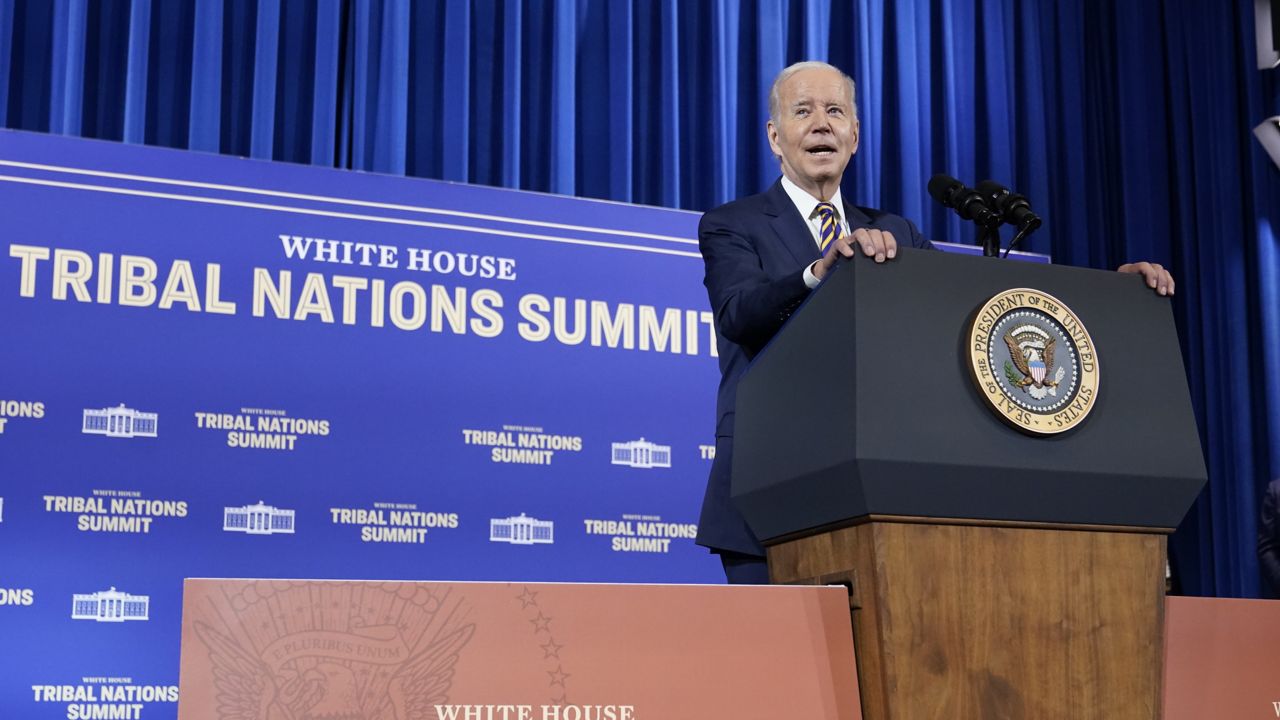Speaking at the second Tribal Nations Summit of his time in office, President Joe Biden on Wednesday said his administration is committed to working alongside Native American tribes to ensure the federal government is fully meeting their needs.
“I made a commitment [that] my administration would prioritize and respect nation-to-nation relationships,” Biden said, speaking to leaders and representatives from hundreds of Native American tribes attending the summit at the Department of the Interior. “And I'm gonna make sure that happens. I hope our work in the past two years has demonstrated that we're meeting that commitment.”
Biden thanked Interior Secretary Deb Haaland, the first-ever Native American to serve as a Cabinet secretary in U.S. history, for her work in the role over the past several years. He went on to emphasize his administration’s focus on increasing representation across the board, acknowledging that the United States owes tribal nations “a solemn trust and treaty – obligations that we haven't always lived up to.”
“I am so proud to lead this work here at Interior,” Sec. Haaland said in her own remarks. “This agency, once charged with assimilating our people through family separation, is now leading the work to heal those broken promises and to strengthen Indian country from day one.”
The Biden administration has worked to strengthen partnerships with tribal nations over the past two years, in part by prioritizing tribal engagement and feedback in distributing funding from the last COVID-19 aid package and signing off on legislation that helped address health care, lost revenue, housing, internet access and other needs in Indian Country. The 574 federally recognized tribes in the U.S. received a combined $20 billion in American Rescue Plan Act funding under the Biden administration.
The president on Wednesday announced a series of actions he said are a “result of a meaningful and deliberate consultation process” with numerous tribal leaders.
“My administration listened. We heard you and we're implementing many of the changes you asked for,” Biden said. “Today, I signed a new presidential memorandum that improves consultation between the federal government and tribal nations based on key principles. Consultation has to be a two-way, nation-to-nation exchange.”
Under the memorandum, nine federal agencies will be required to implement new consultation policies; another 17 federal agencies will soon release updated best practices on how to preserve rights of tribal nations during “agency decision-making processes.”
More tangible announcements include the administration’s Electric Vehicle Initiative, which will focus on implementing funding from the Bipartisan Infrastructure Act to map EV infrastructure across Tribal Nations, helping tribes purchase EV fleets for schools and other modes of transportation, increasing training across tribal nations in EV infrastructure to make more job opportunities, among other efforts.
“My administration is going to work with the tribes to help them transition to clean energy development and do it quickly,” Biden added on Wednesday. “That includes the federal government, as the largest single energy consumer in the world, buying more carbon free electricity from tribal energy producers.”
In remarks made later on Wednesday, Vice President Kamala Harris noted actions the White House has taken with a focus on health care among Native Americans. The expansion of post-partum Medicaid coverage, she said, means that Native women — a population that's more than twice as likely to die from pregnancy-related complications than average — now have greater access to health care, and specifically women's health services. And federally-backed community lenders have allowed Native American banks to help build health care and addiction treatment facilities.
Harris also promised that the administration would continue to back Native solutions to the climate crisis — which disproportionately affects Native communities impacted by toxic air and water pollution. This year, she said, the administration secured $720 million for tribal communities to fund Native-led climate projects.
"All of this work is crtically important and it is interconnected," Harris said; Reduced air and water pollution leads to positive maternal health outcomes and better health for children; better health care for women leads to stronger families and communities; increased access to capital creates better opportunities for people to take advantage of.
Harris also promised that the White House would continue to defend the Indian Child Welfare Act, a federal law that governs the removal of Native American children from ther families in child welfare cases.
The law, advocated for by Native activists, was a response to decades of federal policies foricibly remocing Native children from families and placing them in "residential schools" that largely severed connections to their culture. The law is currently before the U.S. Supreme Court, as three states — and a handful of families that sought to adopt native children — seek to have the law declared unconstitutional.
"As our administration fights to create an America where all people ahve the opportunity to succeed and thrive, we will continue to depend on your freindship, on your leadership and on your partnership," Harris said.
The Biden administration also announced Wednesday that the Commerce Department will work with tribes to co-manage public resources like water and fisheries. The Agriculture Department and the Interior Department have signed 20 co-stewardship agreements with tribes, and another 60 are under review, the administration said.
A new report being released in conjunction with the summit will outline best practices on integrating tribal treaty rights, like hunting and fishing on ancestral lands, into the decision-making process for federal agencies.
The gathering coincides with National Native American Heritage Month, which is celebrated in November.
The Associated Press contributed to this report.



